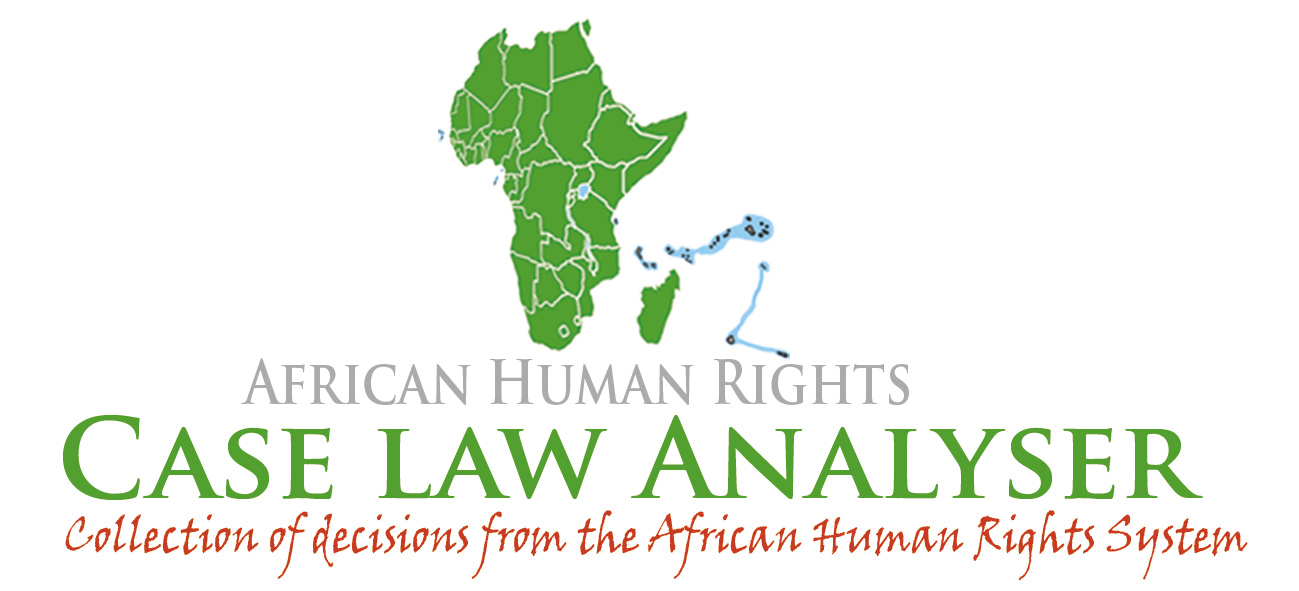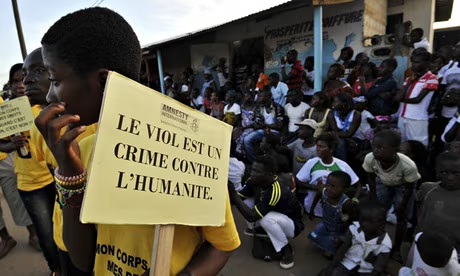African Human Rights Case law Analyser receives its 10,000 visitor
 IHRDA celebrates today an important landmark. More than 10,000 people have visited the African Human Rights Case law Analyser since its launch on November 8 2010. The Case law Analyser offers the most exhaustive access to the decisions of the African Commission on Human and Peoples’ Rights in English and French.
IHRDA celebrates today an important landmark. More than 10,000 people have visited the African Human Rights Case law Analyser since its launch on November 8 2010. The Case law Analyser offers the most exhaustive access to the decisions of the African Commission on Human and Peoples’ Rights in English and French.
These last 11 months, the Caselaw Analyser has been visited 18 922 times, and those visits came from 159 countries or territories. 7289 visits came from Africa, 7181 from Europe, 3056 from Americas, and the rest from Asia and Oceania. These visits used 72 different languages and were performed by 53.30% new visitors, and 46.70% of returning visitors.
IHRDA and our partners HURIDOCS are honoured by the regularity with which researchers return to the Case law Analyser, combined with the constant growth of new visits and the time spent visiting the Analyser (an average of 7 minutes). This attests to the quality of information and display of the Case law Analyser. The research friendliness of the Analyser is confirmed by the diversity of the origins of the visits, from traffic sources to languages and territories.
The growth of the Analyser has only been possible thanks to the comments and criticisms of those who visited it. On this very special date, not only do we thank you, but we reiterate that we heartily welcome your comments, critique, complaints and notifications of any errors on the system, to help us further improve the access to the most comprehensive multilingual collection of African human rights case law.
Background
The African Human Rights Case law Analyser (CLA) is a joint project of the Institute for Human Rights and Development in Africa (IHRDA) and Human Rights Information and Documentation Systems (HURIDOCS). Its principal aim is to promote human rights in Africa by filling the information lacuna on the African Human Rights System using the most intuitive and research friendly information systems to provide free access to the most comprehensive multilingual collection of African human rights case law.
Case law Analyser functions
The CLA goes beyond simply listing case law but offers effective tools for its high quality analysis. The CLA is unrivalled in its research friendly innovations, among which are:
- it highlights primary case law so the uninitiated user easily finds relevant information;
- it automatically computes jurisprudential rank of each decision by calculating the number of citations;
- it provides easy browsing experience;
- it allows the researcher to simultaneously read a decision and the text of all law and case law authorities cited in it by loading all these texts within the same reading pane. We call this unique “inline loading”;
- It allows researchers to save their research by singing-up and maintaining their own private account, just like on Yahoo or Gmail. Through this personal account, researchers can bookmark interesting decisions and paragraphs, and annotate them with either private of public comments.
The CLA was launched on November 8 2010 in Banjul, The Gambia, at the NGO Forum before the 48 ACmHPR Ordinary Session by the Chair of the ACmHPR, Me Reine Alapini-Gansou in the presence of attending human rights defenders as well as a member of the African Court on Human and Peoples’ Rights, Justice El Hadji Guissé.
Later in mid 2011, IHRDA and HURIDOCS began making improvements on the CLA. These improvements include:
- reworking of the layout of the CLA to further exhibit its unique functions (like comments and personal research saving accounts);
- harmonise duplications (like merge the two search engines that the CLA had earlier);
- exhibit more effectively the CLA’s enormous stock of meta data on case law that now available on the right-hand column of the search page;
- highlight the list of keywords;
- add case headnotes to further enhance ease of use for researchers;
- add case graphs. These are a uniquely innovative feature that allows researchers to visualise in a easy to understand graph, the entire breadth of citation links of a particular decision. We hope this visual representation of jurisprudential history will reanimate the study of African human rights case law;
- add a convenient feedback service that allows visitors to the website to directly chat with one of our research support staff. When staff are offline, the feedback service will send us an email with your comments.
The work on the CLA is ongoing and heartily welcome your comments, critique, complaints and notifications of any errors on the system which we will endeavour to redress as soon as possible.
Collection of all African human rights case law
We will be working in 2012 to expand the coverage of the CLA to include five (5) other supra-national human rights complaints-handling bodies in Africa:
- the African Court on Human and Peoples’ Rights (AfCHPR),
- the African Committee of Experts on the Rights and Welfare of the Child (ACERWC)
- the SADC Tribunal,
- the EAC Court, and
- the ECOWAS Community Court of Justice.
All the case law of Africa will be integrated into one easily inter-navigable system which will allow researchers to compare case law across all these judicial instances.
Furthermore, although Portuguese is the official language of 6 African countries, the AU, ECOWAS and SADC, availability of African human rights case law in Portuguese remains low. The ACmHPR has only made 10 of its 183 decisions available in Portuguese. The other 5 human rights instances also have none of their case law in Portuguese. Adding a Portuguese version of the CLA, would significantly redress this imbalance.







